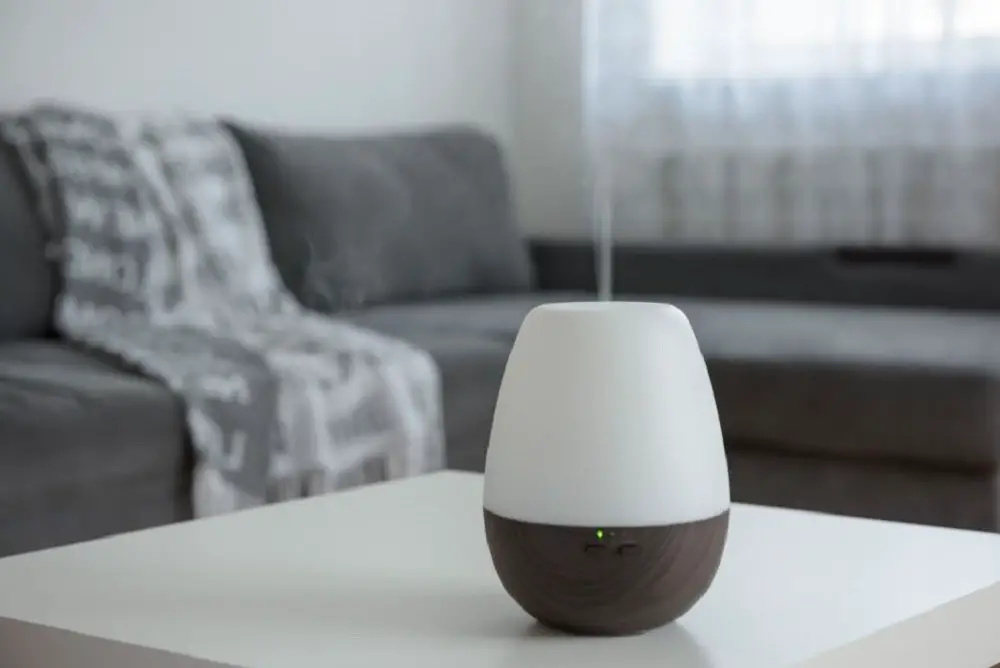A diffuser is a superb way to spread essential oils around the house. Not only do they smell great, but there’s no fire risk like you have with oil burners or scented candles. Regrettably, there’s more to essential oil safety than picking a pretty smell and spreading it as you please. Which essential oils can you use? Are there oils you should never put into a diffuser? Does it matter if you have kids and pets? I’ll answer all your diffuser based essential oil questions so you can get the most out of your oils without risking your health.
Can you use any essential oil in a diffuser? No, you cannot use just any essential oil in a diffuser. Although you can inhale some varieties safely, others are simply not recommended for this type of dispersal. Some essential oils, when diffused release VOCs (volatile organic compounds) which are not safe to breathe in.
Best Essential Oils for a Diffuser
Using essential oils in a diffuser may take a little forethought, but it’s well worth the time. Not only will your home smell wonderful, but you’ll also raise the humidity level slightly, which can aid in easy breathing. Remember, a little goes a long way, so be careful not to overdo it.
Typically, you need only three to five drops per hundred milliliters of water. Take the time to measure your drops patiently to get a good, but not overwhelming scent. Too much can smell cloying and wrong instead of making your home more delightful.
When you want variety, an excellent mixed batch of essential oils like URPOWER Sixteen Essential Oils Gift Set is perfect. Change the mood as many times as you like and try out a little of everything. Best of all, URPOWER has a hundred percent satisfaction guarantee. Check the outstanding Amazon reviews right here.
Best Diffuser Oils
Although many essential oils are lovely in a diffuser, some have more benefits than the scent alone. For example, high-quality lavender and chamomile oils are anxiolytic or stress relieving and mildly sedative. Hence, they can help you stay calm and aid in sleeping at night.
Peppermint essential oil can help relieve headaches. Meanwhile, rose oil or vanilla can set a romantic mood. Frankincense is superb for anxiety and depression.
Finally, grapefruit is cephalic. In other words, it helps with alertness and mental clarity. Many other useful oils can help with mood, sleep, focus, and more. When in doubt, ask a professional like your doctor or a licensed aromatherapist which oils will best suit your needs.
Additionally, you should keep in mind that, for most homes, you don’t need to run a diffuser all day. Instead, turn it on up to three times a day, and run it for about half an hour. The smell will linger for hours, and you won’t need to worry about overdoing it with the essential oils.
For smaller spaces, I suggest the Ultimate Aromatherapy Diffuser & Essential Oil Set from Amazon. With scents like lavender, jasmine, peppermint, and tea tree, you can rest, wake up, focus, or relax easily. Most importantly, not only do you get a high-quality diffuser as well, but all the oils come in dark glass to prevent degradation. Find out more when you click here.
Essential Oils to Avoid Diffusing
Sure, your diffuser is an ideal method for disbursing your favorite scents throughout the house. People with asthma or other respiratory issues should always do meticulous research before putting anything into their air. Additionally, pets and small children tend to be more or differently sensitive to some scents and oils.
You should never just jump to the conclusion that something is safe because it’s sold without a warning sign. Although we live in a time when fast-food coffee comes with a label that says it’s hot, not every company will think of every possible use. Hence, some warnings might be absent.
First, you should always ask whether anyone is allergic. Seasonal allergies are exacerbated by exposure. If you have a lot of people through your home, it’s best to keep the diffuser off while you have company. Likewise, if you have any trouble, from sneezing to itching or other sudden discomforts, perhaps you should switch oils.
Essential Oils & Kids
According to Johns Hopkins, All Children’s Hospital children are much more likely to have an adverse reaction to essential oils than adults. Before you put any essential oil in a diffuser in your home with children, you should consult a medical professional. Ask your pediatrician for help finding appropriate information on the subject.
Some oils you should never diffuse. For example, Birch and wintergreen have methyl salicylate. Children, pets, and even adults can have severe issues with inhaled methyl salicylate. When in doubt, leave it out.
Unfortunately, the danger can include oils sold for children’s use. Camphor is a sad example of a standard product sold for cold and flu season that can actually harm children. Nevertheless, each year too many parents put camphor into humidifiers and diffusers near sick kids.
Essential Oils & Your Pets
No one wants a sick pet. We love our furry buddies after all, and vet bills are expensive. Unfortunately, diffusers aren’t the best choice around your favorite Fido or Cleo. If your pet inhales or knocks over and consumes those oils, they can become very ill.
Symptoms of essential oil toxicity vary greatly. Changes in behavior can look similar to drunkenness, lethargy, or other illnesses that cause vomiting and diarrhea. If you suspect your pet is poisoned, even by accident, go to an emergency vet right away or call the Pet Poison Helpline at 1-800-213-6680. Alternatively, you can click here for 1:1 online vet assistance with poison issues.
Never Use These Oils Around Pets
Although this list is far from complete, some of the commonly known problematic oils are listed below. Any pet can be allergic to a specific oil, so use caution even if your essential oils are ‘safe’ for pets.
- Cinnamon- Cinamon oil can also cause chemical burns on human skin if not properly diluted. I would not recommend diffusing much of this into the air.
- Citrus- This includes lemon, lime, grapefruit, and other citrus oils like orange.
- Clove- Clove oil is outstanding for a toothache, but it’s not healthy for your cat.
- Eucalyptus- While eucalyptus in a warm bath can help some people breathe better, some oils can cause severe problems, including kidney failure for furry pets.
- Pennyroyal- As a member of the mint family, pennyroyal is related to catnip, but that doesn’t make it pet safe. Dogs also have problems inhaling this particular oil.
- Peppermint- To you, this might smell like winter or holidays, but it signals big trouble for your furry friend.
- Pine- That forest smell is something you need to leave outdoors if you have pets. It can get on their fur or skin, and then they ingest it.
- Sweet Birch- You probably haven’t thought much about trees being a source of potential pet health issues, but you’d be surprised by how many of them can cause a severe problem.
- Tea Tree, aka Melaleuca- Please do not diffuse tea tree oil. Not only should your pets avoid breathing it in, but you should too. Yes, it is excellent topically on toenail fungus, but melaleuca does not belong inside the body.
- Wintergreen- Here is yet another mint family oil which pets can’t stomach or inhale. In general, steer clear of minty scents.
- Ylang Ylang- Fragrant and gorgeous, ylang-ylang isn’t something you’d consider dangerous if you smelled it, but like the poppies, in The Wizard of Oz, this flower oil can knock your pet out forever.
Please bear in mind that I am not a veterinarian, nor any type of animal specialist, and this is not medical advice. Additionally, these apply to cats and dogs. As most pet owners are aware, exotics, rodents, reptiles, fish, and birds all have unique biologies.
Caring for an Essential Oil Diffuser
Diffusers for essential oil can add fragrance, ambiance, and change the whole mood of your home. However, you need to practice proper care and maintenance of your diffuser for the best results. Luckily, there’s not much to it.
Always wipe off any excess oil or water with a cotton swab when your diffuser runs out. Instead of merely refilling the tank, rinse it with warm water before refilling it. Moreover, if you plan to change scents, you may want to add a little baking soda to your water and let it sit for a few minutes before rinsing.
Once or twice a month, clean out your diffuser with rubbing alcohol. Doing this will help kill off any bacteria or mold hiding inside. Make sure you rinse thoroughly after cleaning with anything other than water.
If you need to fill a large room with aromatic essential oil goodness, then I recommend the Natrogix Nirvana Essential Oils Book Collection. Choose from eighteen different therapeutic grade essential oils like ylang-ylang, tangerine, rosemary, and more. Whatever the season or mood, you’ll have exactly the right diffuser oil on hand. Have yours delivered by Amazon when you click here.
Final Thoughts
A high-quality mist diffuser makes the ideal accessory for any room. Unlike candles that have wax and fire to contend with, you only need water and an outlet or batteries for these cool, safe devices. Change the feel of any room with a light scent by using essential oils you love.
Always ask questions about the products that you inhale. People with pets or children, especially those under age six, should use extra caution. Likewise, anyone with sensitive skin or compromised breathing may want to talk to a doctor first. Ultimately, when used correctly, a diffuser can be a tool for health as well as a way to make your house smell pretty.
Get high-quality oils fro transparent companies that share their process and sources readily. Diffusers, like humidifiers, candles, and many other products are changing the way you breathe, and how you use that is up to you.

